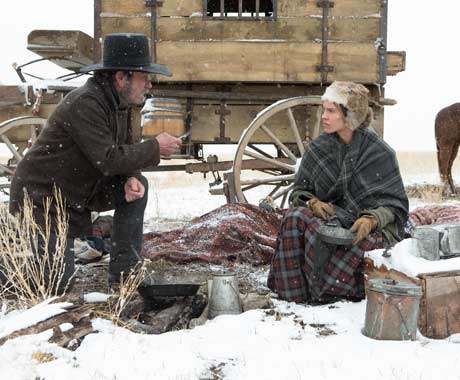The first half of Tommy Lee Jones' adaptation of Glendon Swarthout novel The Homesman is quite effective. Mary Bee Cuddy (Hilary Swank), a former teacher that fled New York to carve out a live for herself in rural Nebraska territory, pleads with virtually every man she encounters to marry her. Though she's established modest wealth and a plot of land of her own, her forthright tendencies and plain aesthetic don't appeal to men looking for someone a bit younger and more subservient. Contrarily, three other women (Grace Gummer, Miranda Otto and Sonja Richter) living the pioneer life that Mary desires are driven insane by the conditions, suggesting that satisfaction is an impossibility for women amidst the western frontier.
When Mary Bee agrees to transport these women back to Iowa — taking on the titular "homesman" role that would traditionally go to a man — there is a sense that these characters might learn from each other or find a shared strength. And while that might have serviced a modern political climate, it wouldn't have been particularly authentic.
Fortunately, The Homesman isn't interested in bullshitting. Not far into her journey, Mary Bee recognizes that in order to survive this trip, she's going to need the help of a man, if only to thwart the attacks of other lonely men eager to take advantage of women in such a situation. She enlists the help of George Briggs (Tommy Lee Jones), a morally questionable man whose disposition tends towards self-serving.
Despite a tendency towards broad comedy to lighten an otherwise foreboding mood, these early sequences show great promise. Both Swank and Jones are committed to their roles and the story refuses to succumb to a place of safety or certainty, making the possibility that George will betray Mary a constant threat.
Without offering any spoilers, there is a dramatic shift in narrative for the final third of the film. Though this event does remain true to the overriding, simultaneously defeatist and realist disposition of the film — which argues that the basic structure of Americana leaves a void for women, minorities and the lower class — it also forces the focus and perspective to change.
It's here that The Homesman struggles to maintain what's been built up. The story, which was originally built from road trip tropes with a decidedly existential angst, becomes one of revenge and redemption. While Jones makes it clear that he's uninterested in adhering to the western genre — he asserts that such a thing doesn't exist in the poorly edited, overly repetitive supplements included with the Blu-ray — these narrative conventions do pop up during the home stretch.
Smartly, everything does come full circle, reiterating a challenging theme and assertion that most people really don't want to hear, but it does so without clarity or focus. In a way, The Homesman gets distracted by its need to sentimentalize a character that doesn't convincingly go through the motions of a full arc or transformation, which hinders the intensity intended by the film's final moments.
(Mongrel Media)When Mary Bee agrees to transport these women back to Iowa — taking on the titular "homesman" role that would traditionally go to a man — there is a sense that these characters might learn from each other or find a shared strength. And while that might have serviced a modern political climate, it wouldn't have been particularly authentic.
Fortunately, The Homesman isn't interested in bullshitting. Not far into her journey, Mary Bee recognizes that in order to survive this trip, she's going to need the help of a man, if only to thwart the attacks of other lonely men eager to take advantage of women in such a situation. She enlists the help of George Briggs (Tommy Lee Jones), a morally questionable man whose disposition tends towards self-serving.
Despite a tendency towards broad comedy to lighten an otherwise foreboding mood, these early sequences show great promise. Both Swank and Jones are committed to their roles and the story refuses to succumb to a place of safety or certainty, making the possibility that George will betray Mary a constant threat.
Without offering any spoilers, there is a dramatic shift in narrative for the final third of the film. Though this event does remain true to the overriding, simultaneously defeatist and realist disposition of the film — which argues that the basic structure of Americana leaves a void for women, minorities and the lower class — it also forces the focus and perspective to change.
It's here that The Homesman struggles to maintain what's been built up. The story, which was originally built from road trip tropes with a decidedly existential angst, becomes one of revenge and redemption. While Jones makes it clear that he's uninterested in adhering to the western genre — he asserts that such a thing doesn't exist in the poorly edited, overly repetitive supplements included with the Blu-ray — these narrative conventions do pop up during the home stretch.
Smartly, everything does come full circle, reiterating a challenging theme and assertion that most people really don't want to hear, but it does so without clarity or focus. In a way, The Homesman gets distracted by its need to sentimentalize a character that doesn't convincingly go through the motions of a full arc or transformation, which hinders the intensity intended by the film's final moments.
